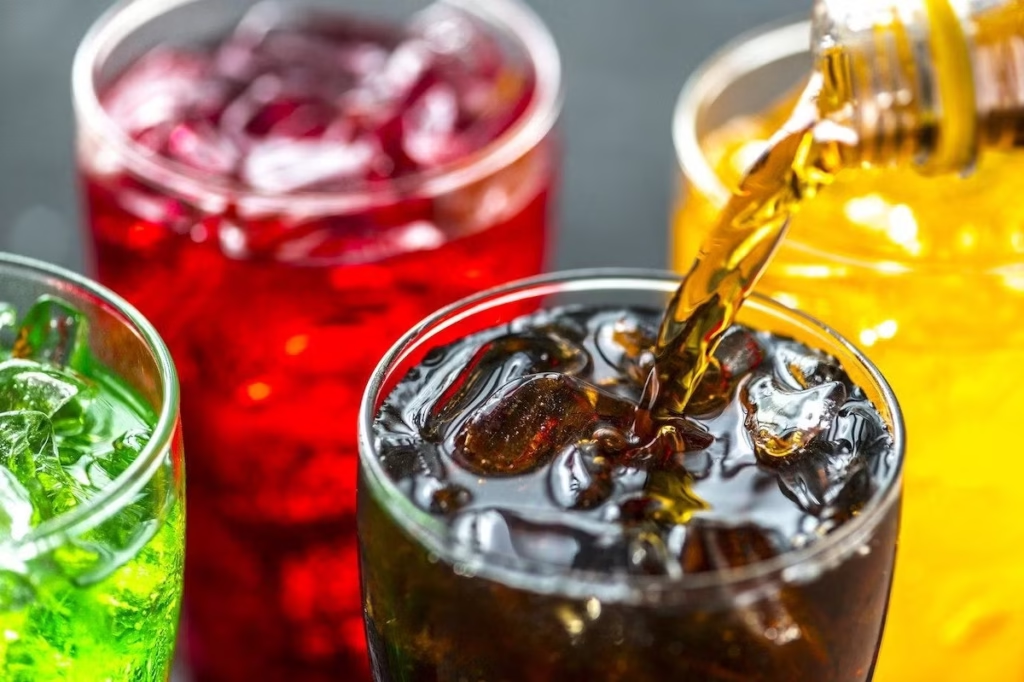Sugary Beverages and Fatty Liver: Risks, Research, and Prevention
Nonalcoholic fatty liver disease (NAFLD), also called metabolic dysfunction-associated steatotic liver disease (MASLD), is one of the fastest-growing liver disorders worldwide. Research increasingly shows that sugary beverages and fatty liver are strongly linked, with even a single can of diet soda daily raising the risk of NAFLD by 60%, and regular sugary drinks increasing it by 50%. These findings challenge the common perception that diet drinks are harmless and emphasize the importance of making informed choices to protect liver health.
How Sugary Beverages and Fatty Liver Contribute to NAFLD
NAFLD occurs when excess fat accumulates in the liver, interfering with its normal function. Over time, this can lead to inflammation, fibrosis, cirrhosis, or even liver cancer. The disease is closely linked to metabolic conditions such as obesity, diabetes, and insulin resistance.
In the United States, approximately 38% of the population is affected by NAFLD, marking a 50% increase over the past three decades. Lifestyle and dietary factors, particularly high consumption of sugary and diet beverages, are major contributors.

Understanding the Link Between Sugary Beverages and Fatty Liver
Impact of Sugar
Sugary drinks are high in added sugars, particularly fructose, which can cause rapid spikes in blood glucose and insulin. This triggers the liver to convert excess sugar into fat, a process known as lipogenesis, leading to fat accumulation in the liver.
Metabolic Effects
Over time, excessive sugary drink intake contributes to insulin resistance, obesity, inflammation, and metabolic syndrome, all of which exacerbate fatty liver development.
Surprising Risks of Diet Beverages
Indirect Impact on Liver
Diet drinks, although low in calories, may still negatively affect liver health. Research shows they can alter gut microbiota, increase insulin secretion, and heighten cravings for sweet foods, indirectly promoting fat deposition in the liver.
Misconceptions About Diet Drinks
Many people assume diet beverages are a safe alternative to sugary drinks. However, studies indicate that replacing sugary drinks with diet drinks does not significantly reduce the risk of fatty liver disease.
Research Evidence: Key Findings
A prospective study followed 124,000 participants over ten years using the UK Biobank. Researchers assessed dietary intake, including consumption of sugary and diet drinks, and monitored liver health.
Key findings include:
- Diet drinks increased NAFLD risk by 60%.
- Sugary beverages increased risk by 50%.
- Replacing these drinks with water reduced risk by 13–15%.
- Switching between diet and sugary drinks did not reduce liver disease risk.
This study provides strong evidence that beverage choices directly influence liver health.
Prevention Strategies Sugary Beverages and Fatty Liver
Choose Water and Unsweetened Drinks
Water, herbal teas, and unsweetened beverages are optimal for liver health. Unlike sugary or diet drinks, they do not disrupt metabolism and help maintain hydration and satiety. https://www.niddk.nih.gov/health-information/liver-disease
Balanced Diet for Sugary Beverages and Fatty Liver
A diet rich in fruits, vegetables, lean proteins, and healthy fats supports liver function and overall metabolic health. Limiting processed foods, refined carbohydrates, and added sugars is essential.
Regular Physical Activity
Exercise enhances insulin sensitivity, reduces hepatic fat, and improves overall metabolism. Active individuals have a significantly lower risk of fatty liver disease compared with sedentary peers.
Early Detection and Management
Routine screening for at-risk individuals may include liver function tests, imaging studies, and evaluation of metabolic risk factors. Healthcare providers should advise patients on the impact of both sugary and diet beverages and encourage healthier alternatives.
For those diagnosed with NAFLD, interventions may include structured weight management, medical treatment for metabolic disorders, and ongoing monitoring to prevent disease progression.
Policy and Public Health Measures
Governments and public health agencies can reduce beverage-related liver risk through:
- Taxing sugary drinks
- Restricting marketing of sweetened beverages to children
- Promoting access to water in schools and public spaces
- Clear labeling of artificial sweeteners
These measures, combined with public education, can help reduce NAFLD prevalence at the population level.
Understanding the Biological Mechanisms
Both sugary and diet drinks influence liver function through:
- Insulin resistance: Promotes fat accumulation in the liver.
- Gut microbiome disruption: Alters metabolism and inflammation.
- Appetite modulation: Increases preference for sweet foods, indirectly increasing liver fat.
Targeting these mechanisms with diet, lifestyle, and emerging therapies is critical for long-term liver health.

Long-Term Health Implications
Regular consumption of sugary and diet drinks affects overall health:
- Weight gain and obesity
- Increased risk of type 2 diabetes
- Cardiovascular disease
- Chronic inflammation
These systemic effects contribute to NAFLD progression and highlight the importance of healthy beverage choices.
Managing Sugary Beverages and Fatty Liver: Recommendations for Individuals
- Limit sugary and diet beverages.
- Prefer water, herbal teas, and unsweetened drinks.
- Maintain a balanced diet and regular exercise routine.
- Monitor liver health through regular checkups, especially if at risk.
Early lifestyle interventions can prevent NAFLD and improve overall metabolic health.
Sugary beverages and diet drinks significantly impact liver health. Both contribute to fat accumulation, metabolic disruption, and increased NAFLD risk. Prevention focuses on replacing these beverages with water, maintaining a balanced diet, exercising regularly, and monitoring liver function.
Awareness, education, and supportive public health measures are essential to reduce the global burden of fatty liver disease. Making informed choices about daily beverages can have a lasting impact on liver health and overall well-being.




